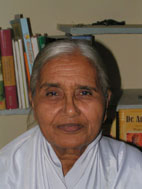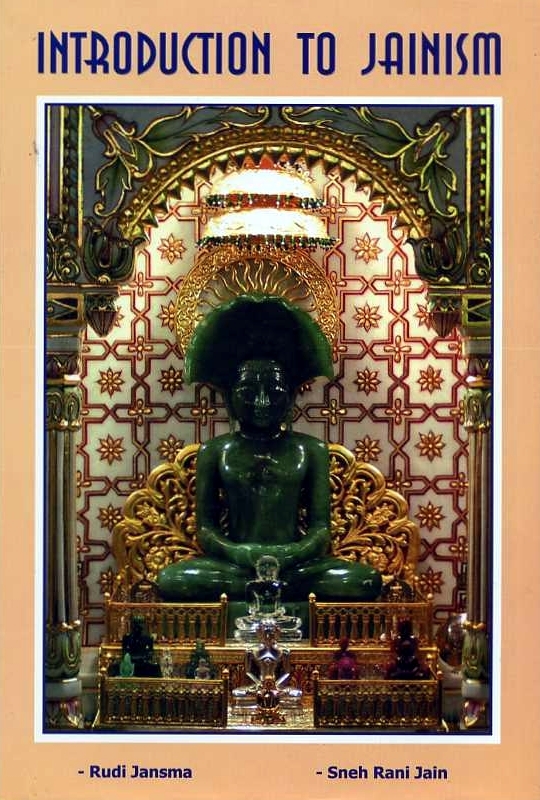I received a phone call from the temple of Sanganer. A very special learned person whom I should absolutely meet had arrived and who was to stay for a while only. So again I made the bone-shaking bus journey to Sanganer. Instead of the eminently dressed gentleman I had imagined, a white-clad female figure appeared before my eye when I was led into a small, almost dark room. Immediately we were friends: we had that feeling of familiarity and friendship that happens only a few times in one’s life. Her white cotton, not entirely clean sari, indicated that she was a nun, or more correctly a brahmāchārinī, bound by many voluntarily taken vows. Her English was almost perfect, and she even spoke some German. We had a short talk, but she had to leave soon. Brahmāchārinī (as I will call her), rarely stays in one place for long. She goes from one sacred place to another, from one site of pilgrimage to another. But she strongly urged me to meet her at Jaipur railway station at three o’clock. She didn’t have to tell me twice, because she was intelligent, entertaining and extremely enthusiastic about her archeological research. At the station I proposed that we went to the station’s restaurant to continue our talk about philosophy, science and Jainism over a snack and a drink. I ordered. She wanted nothing. She took a bottle of water from her luggage, though water was freely available in the restaurant. Even though it was 40 degrees Centigrade she ate and drank only once a day, in accordance with her vows. Moreover she would accept nothing from “outside” i.e. nothing that was not prepared either by herself or by Jains who lived up to the same standards., According to Jain norms, water should be filtered and boiled to prevent any living being from becoming a victim of human consumption. Because she eats very little she needs little sleep, but I have rarely seen her tired. Tasty foods have lost their attraction. She is a radiating and cheerful personality. At the age of 68 she shows more vitality than I, the-55-year old standard-eater-and-drinker on my 55th. Her enthusiasm knows no bounds. During and in between her pilgrimages, she does archeological research into the occurrence all over India of inscriptions in Indus script such as have been found in Harappa and Mohenjo-daro (now in Pakistan). Her conviction is that thousands of years ago the so-called Indus culture was spread all over India; and also that these people were Jains. She has cancer. She has already lost a breast and a kidney. Some time ago she was so weak that she needed help with every movement. But thanks to the blessings of her guru and the community of monks she is now a lot more radiant and happy than the average world citizen. There is no medical proof that her cancer has vanished, and doctors would like to keep a medical eye on her and possibly give her further treatment. But as she sees it, death is only a transition to another form or condition of existence - nothing to be afraid of. So she is no longer interested in any medicine or treatment. Food and water once a day - that is all. Her head is full of plans for future research and publications. She wants to finish her scientific work –which she started only a few years back, after retiring from her profession. she was asked to do so in a dream, and received crucial information. She feels it is her duty to her forebears, co-bearers of a tradition many millennia old. Our special encounter seems more meaningful than a cozy private chat. Karma must have brought us together at the right moment. At the time of our meeting she had written three books (the number would be almost double that a year later). But the language and typographical qualities are “Indian.” I have a digital camera, a laptop and other technical gadgets. She has knowledge, intelligence and fire. We readily agreed that I would go with her, after a month, on a pilgrimage-cum-scientific expedition. But when the gods give assignments, it does not mean that the road will be smooth. On the contrary, one builds character through resistance and conquest.
A few weeks later the telephone rang: “Come at once.” She had gone to a monastery more than a 1000 kilometers to the South. When we met again it was a meeting of friends. She has a deep emotional-spiritual relationship with the leader of the group, guru Āchāryaji, and she is respected by everyone. For the last 35 years she has been following him from pilgrim’s site to pilgrim’s site. Jains are very strict in their principles, but are aware of the relativity of their rules as well. I too was accepted into the community with love and openness, though probably no Westerner had ever been allowed to put his bare feet on the sacred soil. I owe this to the fact that I am a vegetarian, consume no alcohol or drugs, and approach every living being - even the smallest - with care and sympathy. Also I am not married - and that has a very different meaning in such circles in India than it tends to have in the West.
 Dr. Sneh Rani Jain
Dr. Sneh Rani Jain
 Publisher:
Publisher: